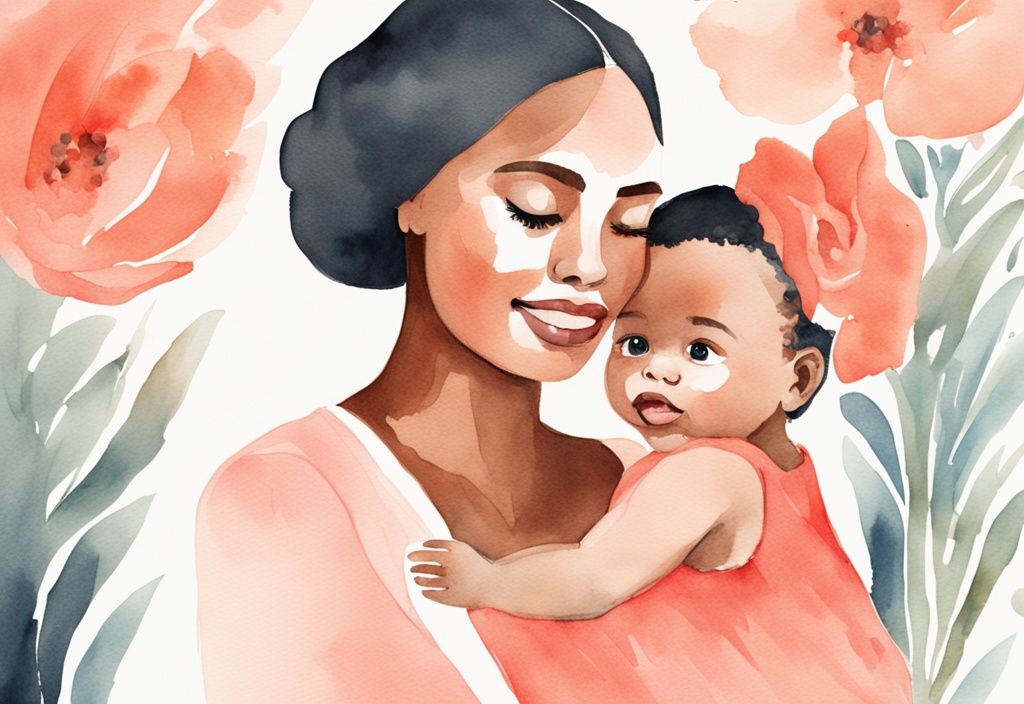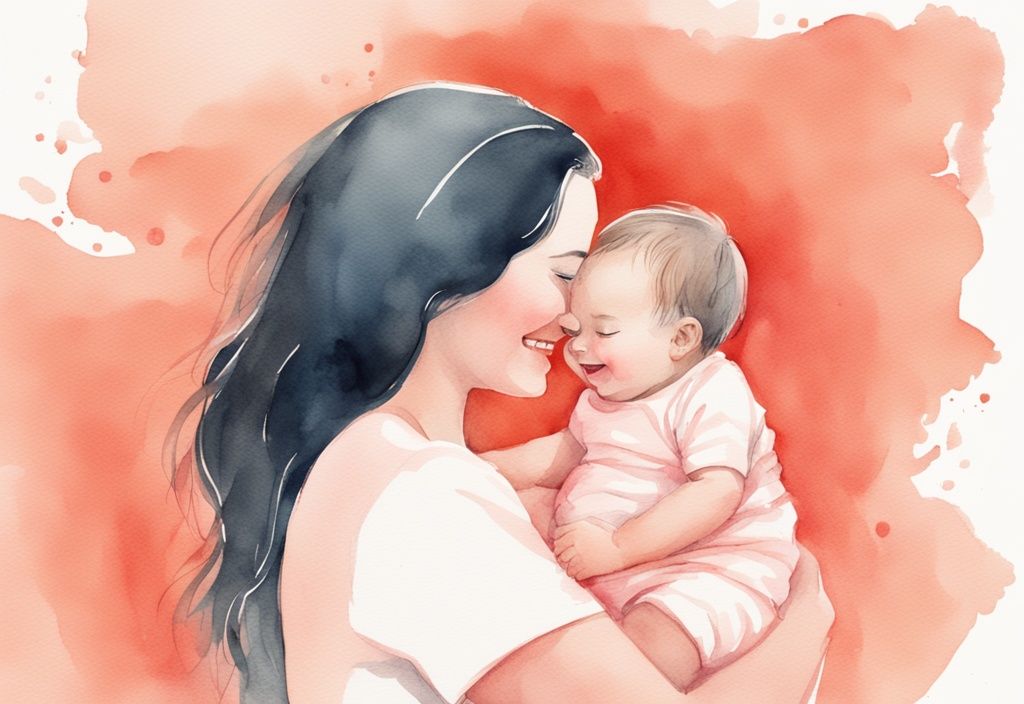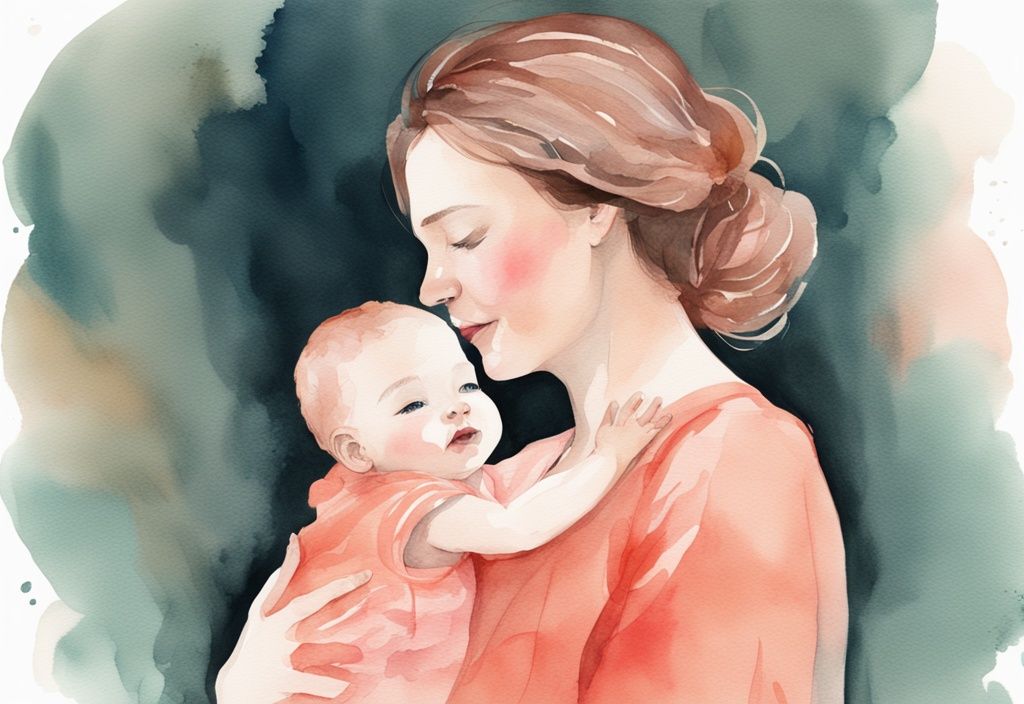Ever gaze at your baby in wonder, experiencing an intense wave of love, and ponder, “Why do I love my baby so much?” It’s an emotion so powerful that it sweeps us off our feet and fills us with inexplicable joy. As a mother of two, I’ve been through this intense rush of love for a tiny being, just like you.
In this article, I’m going to share insights about the profound love we feel for our babies. We’ll dig deep into the essence of this love by exploring biological, emotional, and psychological aspects.
Join me as we unravel the mystery behind the unconditional bond between parent and child. This understanding will shed light on the depth of our feelings, helping us better navigate the highs and lows of our parenting journeys.
1. Unraveling the Biology Behind Intense Parental Love
The bond between parents and their babies is deeply rooted in biology, powered by a range of hormones and neurotransmitters that create feelings of love and attachment. Let’s delve into how these biological components contribute to the overwhelming love parents feel for their little ones.
1.1 The Essential Role of Oxytocin
Oxytocin, often referred to as the “love hormone,” plays a crucial role in why parents find themselves deeply bonded with their babies. During pregnancy, mothers experience heightened levels of oxytocin, preparing them emotionally and physically for childbirth and the nurturing tasks ahead. This hormone orchestrates a series of biochemical processes that enhance the mother’s readiness to bond with her newborn.
After childbirth, activities like skin-to-skin contact and breastfeeding further stimulate the release of oxytocin. This continuous release amplifies feelings of trust, calmness, and profound affection toward the baby, cultivating a strong emotional connection. Oxytocin essentially weaves an invisible but impenetrable bond, emphasizing why parents find themselves thinking, “Why do I love my baby so much?” It creates an environment of security and unwavering parental commitment.
1.2 Dopamine: The Happiness and Bonding Hormone
Dopamine is another fundamental neurotransmitter that sheds light on why you might find yourself asking, “Why do I love my baby so much?” Known for its role in the brain’s pleasure and reward systems, dopamine is activated during joyful interactions with the baby, such as smiling, cooing, and laughing. These bonding moments trigger a dopamine release, enhancing feelings of happiness and reinforcing emotional attachment.
The “highs” parents experience during these bonding activities are dopamine’s doing, making each interaction with the baby a more rewarding experience. Active caregiving and positive engagements further boost dopamine levels, ensuring that loving behavior becomes a continuous cycle of joy and attachment. This biochemical mechanism securely strengthens the parental bond.
1.3 How Changes in Father’s Hormones Enhance Bonding
Not just mothers, but fathers also undergo significant hormonal changes that explain why you might be so enamored with your baby. After the baby’s birth, fathers experience a notable increase in oxytocin and prolactin levels, combined with a decrease in testosterone. This hormonal adjustment fosters a nurturing and protective instinct, ensuring that fathers too develop a profound emotional closeness with their offspring.
Engaging in physical contact and caregiving activities triggers similar hormonal reactions in fathers as it does in mothers. These biologically driven changes highlight that intense parental love is not exclusive to mothers but is a shared, intrinsic experience for both parents. The natural restructuring of a father’s hormonal balance underscores the biological roots of paternal love and commitment.
2. The Emotional and Psychological Aspects of Parental Love
In this section, we’ll explore how the emotional and psychological elements of parenting answer the heartfelt question, “why do I love my baby so much.” Through an intimate look at the joys and fulfillment babies bring, the meaning of unconditional love, and the influential factors shaping parental love, we’ll uncover the depths of this beautiful bond.
2.1 How Babies Provide Emotional Fulfillment and Joy
Babies bring immense joy by fulfilling a fundamental human need: the desire for connection and love. Their dependence on parents for comfort, care, and sustenance creates an irreplaceable bond, answering the question, “why do I love my baby so much.” This reliance nurtures feelings of purpose and fulfillment in parents.

Daily care routines, like feeding, bathing, and bedtime rituals, provide numerous moments of simple happiness and satisfaction. Each smile, coo, and milestone—such as the first laugh or crawl—evokes profound pride and joy, further enhancing the emotional attachment between parent and child.
2.2 Unconditional Love: A Two Way Journey
Unconditional love forms the core of the parent-child relationship. By meeting the baby’s fundamental needs, parents create a secure and trusting environment, answering why do I love my baby so much with a tangible sense of emotional fulfillment. The baby’s innocent affection and absolute dependence reciprocate this emotional investment, creating a unique and powerful bond.
This mutual exchange of love not only fosters a strong, lifelong connection but also reinforces the parent’s sense of identity and purpose. The deep satisfaction derived from providing unconditional love cements the parent’s emotional commitment, making the relationship a two-way journey of growth and fulfillment.
2.3 Social and Cognitive Influences on Parental Love
Parental love is profoundly shaped by social and cognitive factors. Social expectations and cultural norms influence behaviors and perceptions, playing a critical role in why you might ask, “why do I love my baby so much.” Cognitive attachment theories, positing that consistent caregiving fosters strong bonds, explain the natural instinct to protect and nurture.
Parental instincts, a blend of biological and social cues, drive this desire. Despite external challenges—such as negative comments or societal pressures—the foundational love for a baby remains resilient. This resilience underscores the inherent, essential nature of the parental bond, deeply rooted in both cognitive understanding and social context.
3. The Power of Physical Closeness for Parent-Child Bonding
3.1 Why Skin-to-Skin Contact is so Powerful
The question, “why do I love my baby so much,” can be partly answered by understanding the profound effects of skin-to-skin contact. Right after birth, skin-to-skin contact becomes a crucial practice, promoting not just immediate bonding but also long-lasting emotional stability. This practice triggers a significant release of oxytocin, the “love hormone,” in both mothers and fathers, solidifying emotional connections and fostering deep maternal and paternal bonds.
Beyond the emotional aspects, skin-to-skin contact influences the baby’s physiological well-being. By being close, parents help regulate their baby’s temperature and heartbeat, reducing stress for both parties involved. This physical closeness provides the newborn with a sense of security and comfort, essential for their initial adaptation to the outside world. Touch becomes the primary medium of communication between parents and their baby, nurturing a strong emotional connection that answers the heart’s query, “why do I love my baby so much.”
3.2 Daily Interactions: Small Moments, Immense Love
Daily routines offer countless opportunities for parents to wonder, “why do I love my baby so much.” Simple activities like feeding, bathing, and playing are not just chores but golden moments to fortify emotional bonds with the baby. Every minor act of caregiving collectively builds a repository of shared love and connection.
During these daily interactions, eye contact, gentle touches, and comforting words hold immense power. When parents gaze lovingly into their baby’s eyes or softly caress their skin, it fosters an environment of trust and affection. Such consistent, loving behavior from parents not only strengthens the bond but also provides emotional stability for the child.
It’s through these regular, heartfelt interactions that parents derive the answer to “why do I love my baby so much,” as each moment reinforces the profound love and attachment inherent in the parent-child relationship.

4. The Joy in Observing Your Baby’s Development
4.1 From First Smiles to First Steps: Celebrating Milestones
Witnessing your baby’s developmental milestones, from their first smile to those adorable first steps, brings an overwhelming sense of joy and excitement. Each of these precious moments reflects your baby’s growing independence and unique personality, reminding you daily why you love your baby so much. Celebrating these milestones deepens your bond, turning these experiences into cherished memories that will strengthen your relationship for years to come.
Each milestone feels like a significant accomplishment, filling you with pride as you watch your baby grow and achieve. These shared experiences aren’t just fleeting moments—they are foundational to the loving connection you continue to build. Every giggle, babble, and unsteady step reinforces the deep emotional fulfilment that comes with parenting.
4.2 How Parenting Instincts Align with Baby’s Development
Parental instincts naturally adapt and evolve to meet your baby’s growing and ever-changing needs. These instincts act as your internal compass, guiding you to respond intuitively—whether it’s through a comforting touch or soothing words. This alignment is a key reason behind the immense love you feel for your baby.
As your baby progresses through various developmental stages, understanding and supporting these changes becomes essential. Your instincts help you create a nurturing environment tailored to your baby’s unique needs, ensuring their physical, emotional, and cognitive development is nurtured consistently.
The bond built through these instinctive responses creates a strong relational foundation. Each intuitive act of care adds layers to the emotional connection, enhancing both your and your baby’s well-being, and reinforcing why you love your baby so much.
5. The Impact of Early Bonding on Future Relationships
5.1 How Early Bonding Sets the Stage for Stronger Relations
Understanding why do I love my baby so much involves recognizing how early bonding shapes future relationships. When infants experience secure bonding with their caregivers, they develop an emotional foundation that profoundly influences their ability to form secure relationships later in life. This foundation is critical because it fosters trust, essential for healthy social interactions.
During these early stages, babies learn to empathize by mirroring the loving and attentive behavior they receive from their parents. This empathy then translates into their interactions beyond the family, making them more capable of forming meaningful connections. Secure attachments formed in infancy also contribute to better emotional regulation and resilience, equipping children to handle life’s challenges more effectively.
The consistency and quality of these early bonding experiences become predictors of future relationship satisfaction and stability. Children who have felt well-loved and understood grow up with a better sense of security and self-worth, which is foundational for building strong, positive relationships throughout their lives.
5.2 How Loving My Baby Influences My Personal Growth
The journey of parenthood answers the question of why do I love my baby so much by profoundly impacting personal growth. Caring for a baby requires immense patience, which naturally develops as parents navigate the various stages of their child’s development. This patience also fosters empathy, as understanding and responding to a baby’s needs cultivates a deeper emotional connection.
Nurturing a baby offers a sense of purpose and fulfillment that enhances a parent’s emotional well-being. While daily caregiving tasks can be challenging, they contribute to a growing sense of accomplishment and joy. Recognizing one’s pivotal role in a baby’s development underscores the significant impact of nurturing love, promoting self-discovery and a better understanding of oneself.
Moreover, seeing the tangible outcomes of your love, such as your baby’s smile or first words, is incredibly rewarding. This process reinforces why do I love my baby so much, as the mutual exchange of affection and care enriches both the parent’s and the baby’s emotional landscapes.
Conclusion
Understanding why do I love my baby so much unveils the multifaceted nature of this profound emotional bond. This love is deeply rooted in our biology, driven by complex hormonal changes that foster strong attachments, trust, and affection even before birth.

The presence of oxytocin and dopamine strengthens these connections, ensuring parents are naturally inclined to care for their babies with unwavering devotion.
Emotionally, the joy and fulfillment derived from nurturing and connecting with your baby are unparalleled. Babies meet emotional needs and instill a sense of purpose, making every milestone and everyday interaction a source of immense pride and satisfaction.
This mutual exchange of unconditional love reinforces a parent’s identity, adding a layer of personal growth and self-discovery that is deeply enriching.
Socially, parental love is reinforced by cultural norms and cognitive attachment theories explaining how caregiving consistency leads to secure bonds. Despite external challenges, the foundational love for your baby remains resilient and crucial.
Ultimately, embracing and nurturing these intense feelings is essential for the healthy development of the child and the lifelong relationship between parent and baby.
Exploring and understanding why do I love my baby so much deepens this bond, highlighting its importance for the overall well-being of both parent and child.
FAQ
Below you’ll find answers to some common questions about the intense love parents feel for their babies. Let’s dive into why that love is so profound and how to manage it.
Why does the love for my baby start even before birth?
Hormonal changes, particularly increased oxytocin, prepare mothers for bonding during pregnancy. Early bonding can occur through talking to and feeling the baby move, establishing a connection.
Why am I feeling overwhelmed by the love for my baby?
Intense emotions are natural due to hormonal changes, new responsibilities, and the profound impact of parenthood. Embrace these feelings as part of the bonding process. You might feel a flood of emotions, and that’s okay—it’s all part of the incredible journey of becoming a parent.
Can strong love for my baby affect my mental health?
Intense love is generally positive but can also lead to feeling overwhelmed or anxious. Balancing self-care with caregiving and seeking support when needed is essential. Remember, it’s okay to ask for help and take time for yourself to ensure you’re at your best for your little one.
Do fathers experience the same intense love for babies?
Yes, fathers experience hormonal changes that promote bonding and strong emotional connections. Consistent caregiving and physical closeness enhance paternal love and attachment. Dads, don’t underestimate the power of your bond—you’re just as important in this beautiful equation.
Can adoptive parents also feel this intense love?
Absolutely, adoptive parents form strong bonds through love and consistent care. Emotional and psychological aspects of attachment are similar regardless of biological relation. The love and commitment you bring into this relationship are what truly matter the most.


